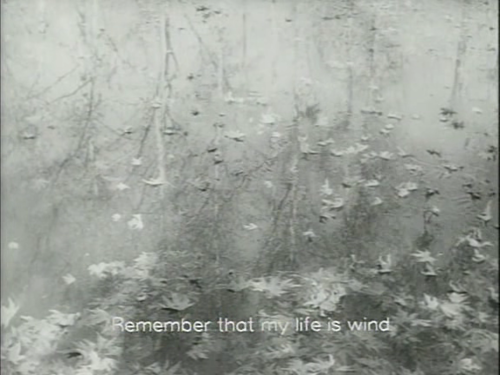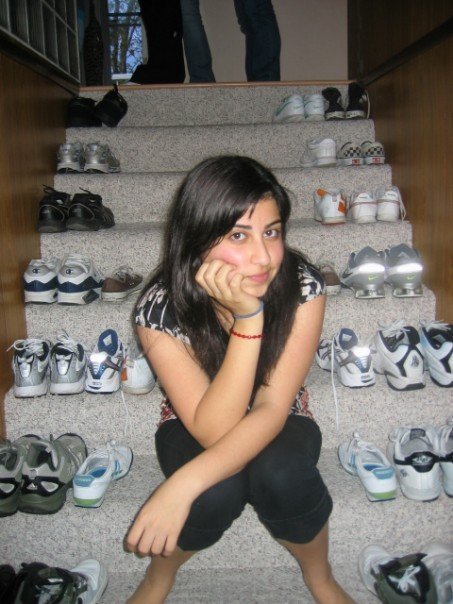Remember that My Life Is Wind: Reflections on Change
By Nyusha Samiei

[Photo: Reflection of trees in a pond. Text: Remember that my life is wind.]
I am sitting on a bridge as I write this.
It has been a long year. Amidst the exhausting work we do, I wonder if we notice the silent revolutions we experience.
I am back home for the summer, and I am sitting on a bridge overlooking the bay where I grew up. Memories of my childhood fill my mind.
I account for changes between my present-day self and my childhood self. Through these transitions, I yearn for some answer, some great truth to life. Things seem graver now than they used to be, but I know I must think with a sense of resilience in order to be involved in any personal change or meaningful resistance.
We have different ways of measuring the past, of measuring endings and beginnings. Ultimately, these units of measure serve to qualify our personal growth. Each new year is a moment to reflect, much like the ending of each school year. As a diasporic individual, I am graced with two new years each year (perhaps I am doubly self-reflective).
Norooz - New Year according to the Iranian Calendar - falls symbolically on the first day of spring. This past Norooz, as with every other, my grandfather pulled out Divan-e Hafez, an anthology of the Iranian poet Hafez’s poems. The tradition is to open the book at random and the chosen poem is your prophesy. My grandfather read a poem for me: it was about the wind. An ancient Iranian poet advised from the grave that, through it all, I should allow my heart to be like the wind, to allow sorrow and joy to pass through me like the wind. Towards the end of the year, when I grew obsessed with Iranian poet Forough Farrokhzad, I watched her film The House is Black. The movie shows lepers living in abjection, quarantined from society. We hear Farrokhzad’s voice narrating lines from Biblical and Islamic texts, as well as her own poetry. One line struck me: “Remember that my life is wind.”
I sit by the bridge, as the wind passes by me.
I often think of this theme. I think of the transience of things, how our identities are hybrid and fluid. What bothers me about this idea of wind is that we yearn for something with teeth, something to hold on to.
I returned to my high school in order to write this.
It has been four years. I hardly relate to myself.
I am trying to capture an image as I walk up the hill to the secluded school in the forest—how does space affect us? When I return, which part of me is ignited? Can I recreate the same feelings associated with the memory? Will I ever feel confident in that same way again? Will I find refuge in the security of that school system?
I am very blatant about my insecurities and shortcomings; perhaps this is not wise. Sometimes I think that through the performing of insecurity, displaying and dissecting it through various platforms and conversations, we are purged of it. I think of Susan Sontag (although she was more reserved in openly displaying her insecurities): “I’m only interested in people engaged in a project of self-transformation.”
Later, I had the chance to speak with one of my favourite high school teachers. As I waited, a student asked me, “Are you in grade 12?”
“No, actually I just finished my 4th year of university.”
“Oh wow, I’m in grade 11. Is university harder? Is it better?”
Is university better? What is it like?
 [Photo: Nyusha sitting on a flight of stairs. The stairs have shoes lined up neatly on each step.]
[Photo: Nyusha sitting on a flight of stairs. The stairs have shoes lined up neatly on each step.]
Back when I was in high school I remember students who had just finished their first year of college would return and share stories. “It is so much better. It gets so much better.”
What they failed to mention was that college is a terribly lonely place. For the first time, you are confronted directly with solitude and your own company. For some this is a blessing—a chance to move past the restrictions of high school. For others, this is far from the truth. I witnessed some people fall into a sort of fatalism. Others retreated into hopelessness. Cynicism was in fashion. The worst was indifference.
I hardly understand What Life is About, and who does in their early twenties? I did learn a few lessons, though.
For instance, kindness is regenerative. My mother tells me the story of calling her father in tears about experiencing xenophobia after being displaced to France following the revolution. At the end of their long conversations, he would say, “Be good and kind, joonam. You cannot change others, but you can choose to be good.”
I think of college and how often I have felt angry or lonely or mean. And how this bitterness sublimated into my daily actions (I had this thought as I drank morning coffee—talkh, or bitter, in Farsi). It took a while to notice that kindness was necessary Now because cruelty was always possible Later (Jenny Holzer, Survival Series, 1983 - 1985). Really, what I wanted to say to this student was that the transition from high school to college would absolutely be difficult. Perhaps your support system from high school has dispersed. The empty signifiers of popularity have disappeared and you remain weightless: now it is up to you to situate yourself politically, aesthetically, ethically, socially. You spend long stretches of time doing work that seems fruitless. You do things last minute. You find serenity in routine and creativity in chaos. Every now and then you have brief moments of “Wow, this is what it’s all about.” And sometimes these revelations occur weekly and lose their poignancy.
I wish I could have relayed the lessons I had learned, which were painfully aphoristic in nature, and hidden in private experiences:
Work Hard / Ask for Help / Put Fear Aside / Stay in Touch / Drink Water and Eat Well.
But really, in the moment, all I could say was, “College is what you make of it.”
Really? That was all I could think of?
The problem for many of us is that we live in a world without easy answers. Personally, I regularly face the violent disjuncture between homeland, memory, and the body. My heart is torn across continents, and I forget different parts of myself when I am away for too long. Language wounds me, and I cannot explain myself completely coherently in any one of them. Miscommunication muffles the desperation behind profound issues, and we dismiss one another too easily.
In the end, I find brief pockets of calm — here next to the bridge by home, with my old high school teacher, or reading poetry with my grandfather. And I think: tend to these moments as much as you can now and you will be rewarded with witnessing your growth and feeling at peace. This will create the energy you will need later on to contribute to important projects.
All I really wanted to say was: you will be unaware in the moment, but suffering accompanies understanding, as hard work accompanies comfort, eventually you will let go of cynicism like the wind, and somehow through it all, through your project of radical self-transformation, the world will unfurl at your feet…
You can keep up Nyusha Samiei on Twitter @nyushii


